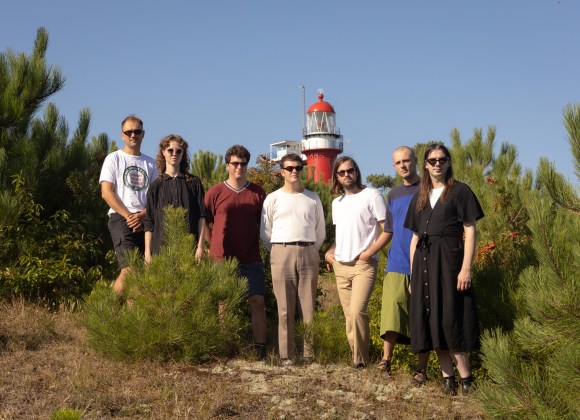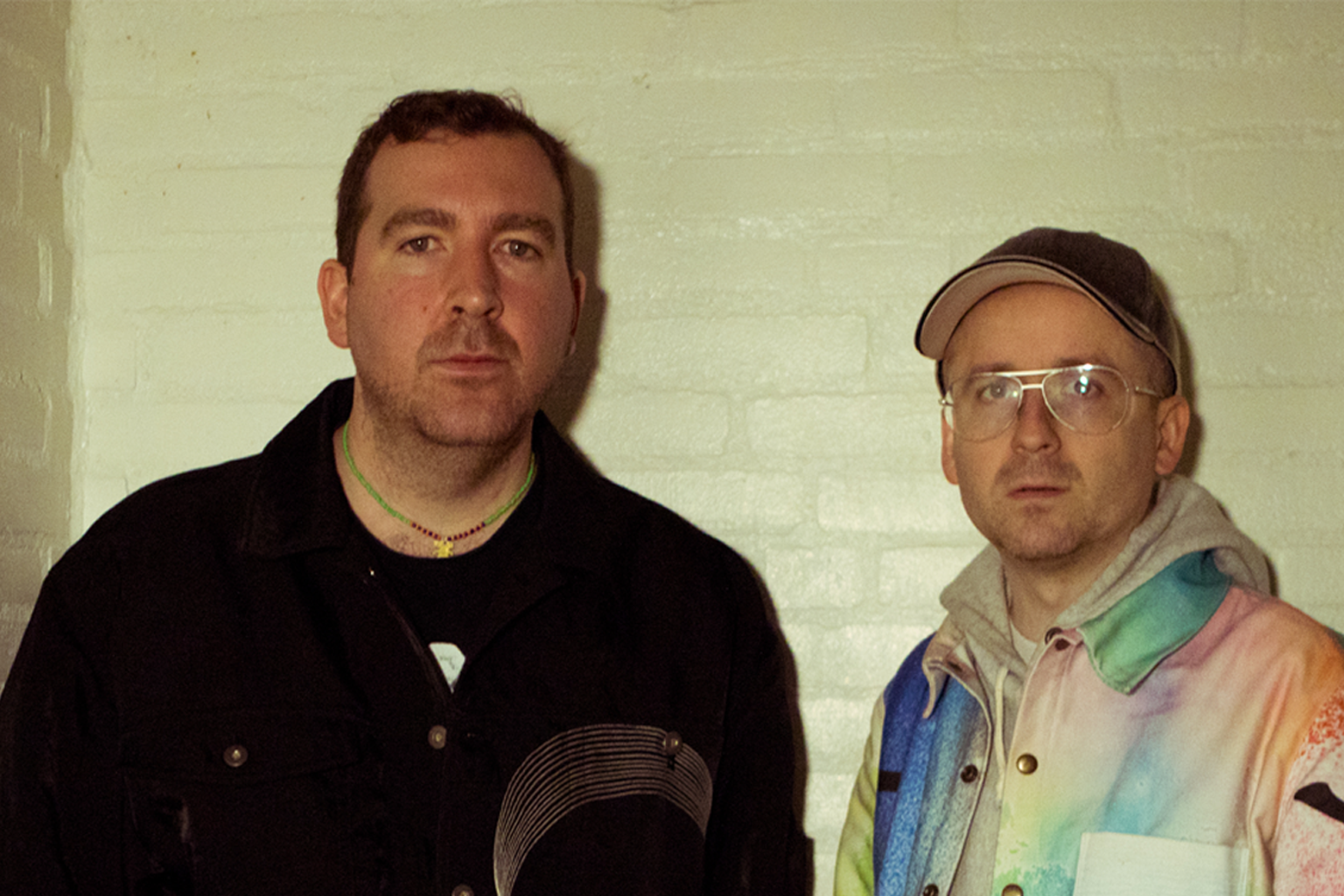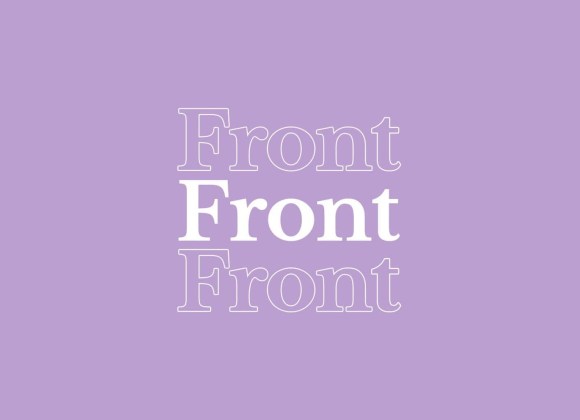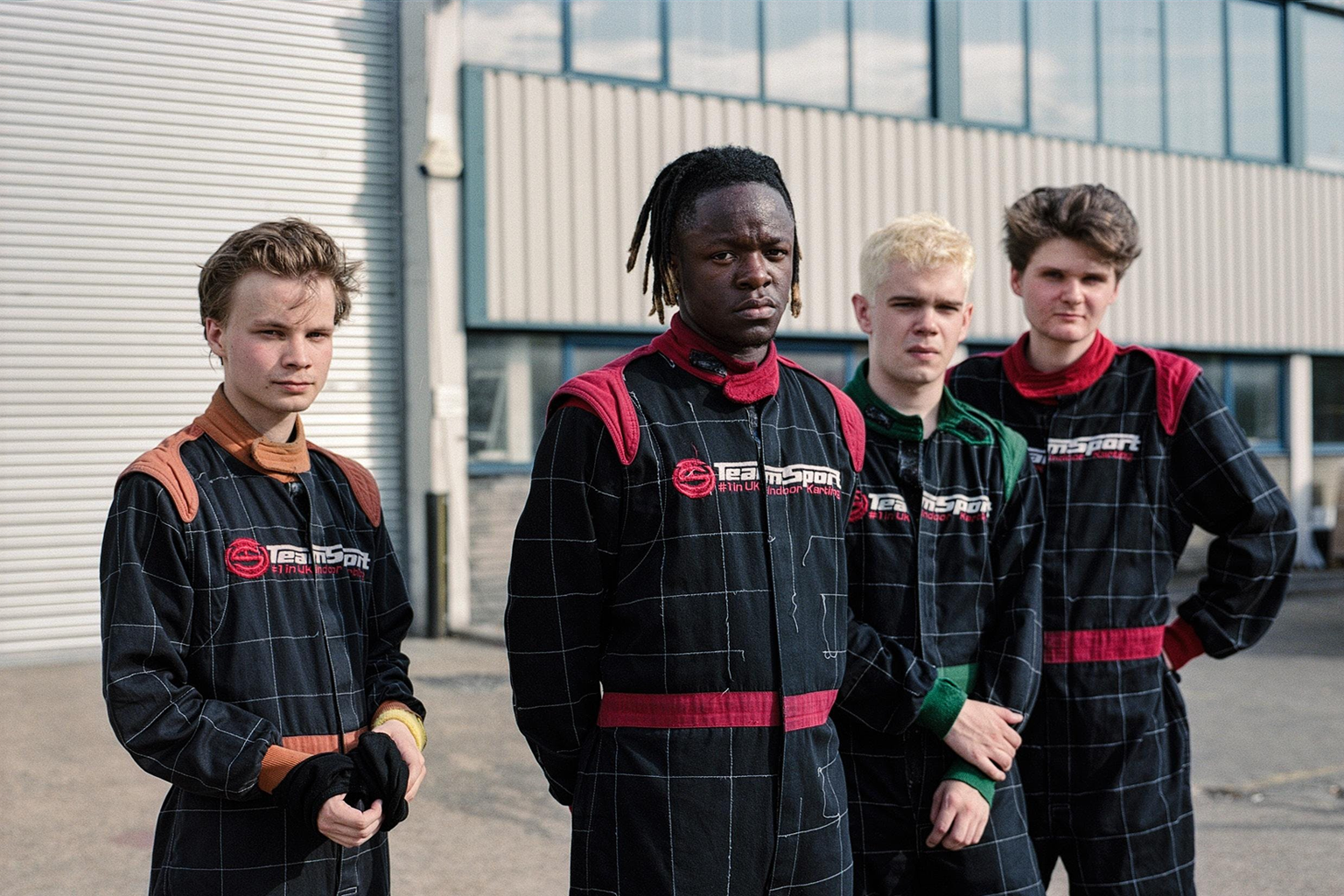Reverberating through the Vlieland forests is the sound of an organistrum, an eleventh-century instrument (also called a hurdy-gurdy) with no fewer than eighty moving parts – “the equivalent of a medieval spaceship”. It is just one of the countless instruments that the Slovenian trio Širom carries with them on tour. “A logistical nightmare,” sighs percussionist, banjo, balafon and gamelan player Iztok Koren. It took them two boat trips to get everything on the island and after the performance it takes at least 45 minutes before all the instruments are loaded off stage again and there is finally time for a walk in the woods.
Written by: Ruben van Dijk
Photos: Tess Janssen
Away from the noise – in this case that of Into The Great Wide Open, where Širom was given the day’s opening slot on the idyllic Open Plek – and even deeper into nature. It is an almost self-evident state of being for Koren, Samo Kutin and Ana Kravanja. Koren comes from the rolling lowlands of Prekmurje, in the far east of Slovenia – right by the Hungarian border. The other two grew up in the far west: Kutin among the caves of the Karst Plateau, Kravanja at the foot of the Julian Alps. Kravanja sighs a little as she tells what nature means to her. “The silence, the seclusion… You can really be alone and clear your head.” “It purifies the soul,” Koren adds with a slight chuckle. The three are aware of their own spirituality – although they wouldn't call it that themselves.
“All music ever is an influence”
Ana Kravanja
One album ago, with these considerations – silence, emptiness, purification of the soul – the trio sought out the untouched nature of their native land and then let the environment shape their improvisations. Caves, mountains, plains. Koren: “These landscapes are part of our childhood, so a lot of memories and feelings from the past come to mind when we are there. That is all very powerful material to work with.” Kutin adds: “Afterwards we discussed the influence of those landscapes, but you can never really know. Of course it is different when you are there, when you walk for hours to a mountain top and start making music there, than when you are at home in your living room, but it is impossible to define.”
Putting things into words is not Širom’s cup of tea anyway. Not only because their experimental folk music contains virtually no lyrics, but mainly because what the trio makes and how they do it is a mainly intuitive matter. The titles of their latest record A Universe That Roasts Blossoms for a Horse, for example, are so remarkable ('A Washed Out Boy Taking Fossils from a Frog Sack', 'Sleight of Hand with a Melting Key'), it’s hard to believe there isn’t an entire imaginary world behind them. That’s not the case, apparently. “It's a kind of pseudo-realistic, automatic writing method that the three of us practice,” Koren says. When asked whether they would like to explain exactly how this method works, their collective reply is a resounding no. "It's our secret." Kutin: “When the title appears to us, all three of us will know: this fits the song exactly.”

During the interview, the three sit together cozily on a picnic blanket, surrounded by silence and pine trees. The view suddenly looks very familiar: it shares a striking resemblance with the album cover to U.F.O.F. by Big Thief, a band of a completely different caliber in a completely different genre, but with an almost spiritual interconnectedness that also characterizes Širom. “We almost sound like a cult,” laughs Kravanja, when Koren attempts to describe their working method: “We try to capture this subconscious flow within us, and to join our three subconscious flows together.” Like the members of Big Thief, Koren, Kutin and Kravanja are each unique in their contribution, but they do indeed seem to breathe as one on stage and on record.
That seemingly obvious unity has led to one big misconception: "People often think that we improvise everything and that what you hear on the record is just one session that we recorded." As if the meticulous interplay with twenty complex instruments simply comes to you when you are so attuned to each other. “But it's a lot of work,” adds Kutin Koren. Listening back endlessly, adjusting things, playing, listening back and so on – until a song is complete and can be played in its entirety without overdubs. “Only when we have played certain songs live for a while is there once again room to allow improvisation.” Kravanja: “Today a few people were particularly impressed with the last two songs, so I was asked which album they were from. ‘From the second record,’ I said, ‘but the piece you just heard doesn't exist.’ Over the years, we can open up our music again. We have a framework; we know when to change instruments and stuff, but as time goes on, a song like that changes too.”

Regularly, and also before the show on Vlieland, Širom’s music is characterized as “Slovenian folk music”. Another misconception, because if you ask there, it turns out there’s very little Slovenian about it. Kutin explains that Slovenian folk music is originally a cappella and that later instrumental extensions (including the Styrian harmonica, the zither and the clarinet, all absent from Širom's work) came mainly from neighboring countries. In that respect, the susceptibility to cultural cross-pollination is the greatest similarity between Širom and the musical tradition of little Slovenia. They themselves call it 'imaginary folk music': music from all over the world is carefully internalized by the trio and served up as if it were part of an already existing, age-old tradition. Or as Koren describes it: “It's like a possible version of folk music from the past, but a past that hasn't happened in this universe.” This manifests itself in a range of instruments; the rebab, a Moroccan bowed instrument; the ghaychak, a lute-like instrument from Iran; the balafon, a West African percussion instrument; the medieval European hurdy-gurdy. “We all travel a lot and take instruments back home with us. Some we buy on the spot, some we make at home. And then we just start making music and we don't really think about where the instruments come from.”
Širom's imagined folk music seems to be that of a world without borders, where borrowing is not a novelty but completely self-evident. no barriers; no distinction at all. “All music ever is an influence,” says Kravanja. However, you will not hear them discuss any social or political implications. Kutin: “I don't know. We don't really have a rational explanation for it. We just feel like we have to make this music and somehow we have a gift for it. We live in a world where we can use all these tools. We love the sounds, so why not use them? Why should we limit ourselves just because…” Kutin pauses for a moment, as if he’s decided to swallow some of his words after all. "Like I said, we don't really think about it, and I think it's good that we don't think too much about this."
A Universe That Roasts Blossoms for a Horse is out now on Tak:til, part of Glitterbeat Records. Editor's note: this article was originally published in Dutch. Some quotes may have been altered in the translation.








